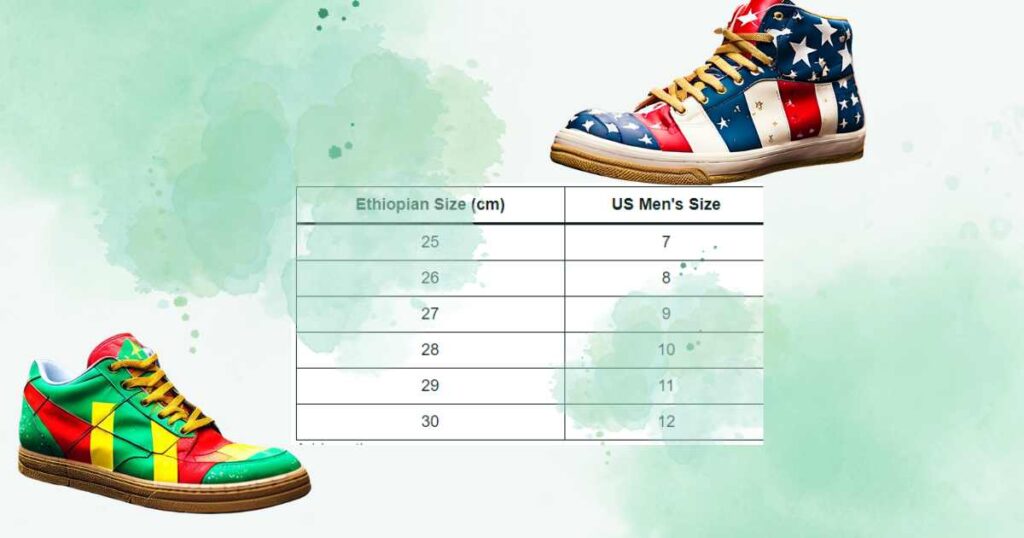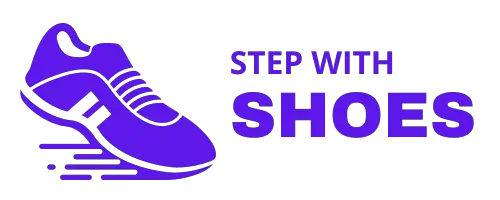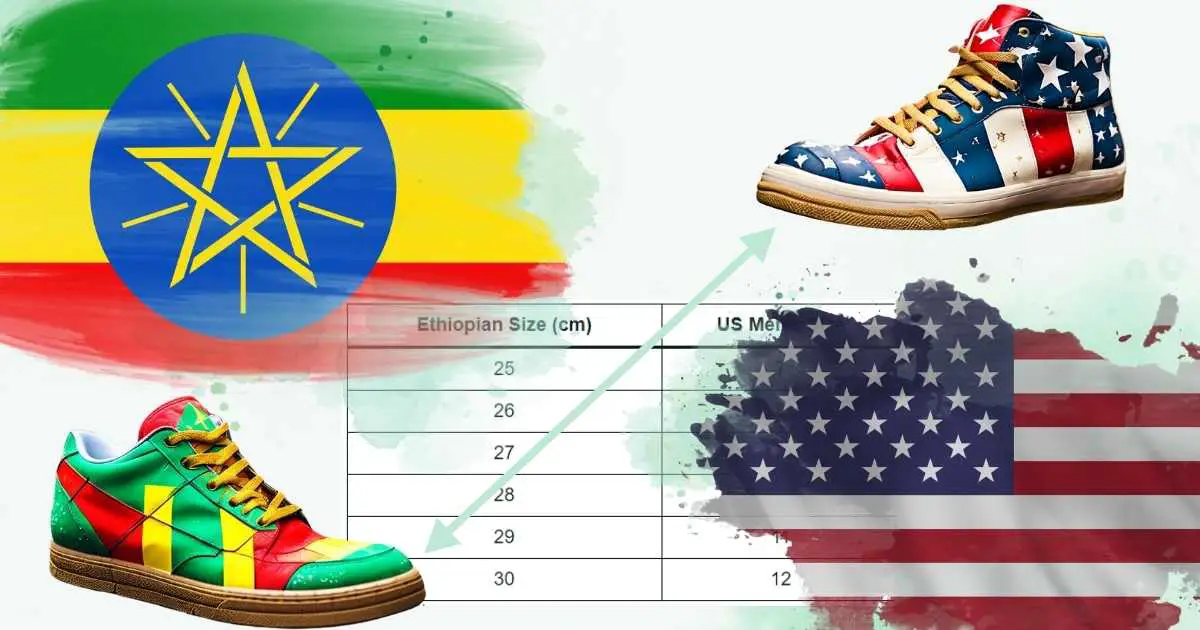Are you curious about changing the sizes of shoes from Ethiopia to US? No worries! In this helpful guide, we’ll give you expert tips on how to do just that. Converting sizes from Ethiopia to the United States might seem tricky, but with a special chart, it’s easy to get it right. By using a helpful tool to change sizes, you can confidently pick out the right size for shoes in the United States that matches what you need from Ethiopia. By reading this guide, you’ll learn all you need to know about changing shoe sizes accurately, so your shoes fit perfectly. Say goodbye to confusion about sizes and hello to comfy, stylish shoes that are just right for you. Get ready to learn lots of useful stuff and see why changing sizes from Ethiopia to the United States is so helpful!
Sizing Up The Difference
Welcome to our comprehensive guide on navigating the differences between Ethiopian and US shoe sizes. Understanding these size variations is essential for anyone looking to purchase shoes across these international borders. Let’s dive into the details and ensure you find the perfect fit!
Ethiopian Shoe Standards
Shoe sizes in Ethiopia are unique, following a sizing chart that differs from much of the world. Women’s, men’s, and children’s footwear sizes may not directly match other international systems. In Ethiopia, shoe sizes tend to use the European metric system, which is centimeters (cm). This can be confusing for those accustomed to US sizing.
Here’s a quick look at Ethiopian shoe size features:
- Measured in centimeters, adhering to the European system.
- Not divided by gender, creating a universal chart for adults.
- Size increments, typically in 6.6 millimeters.
To compare your Ethiopian shoe size to US measurements, a conversion chart is essential.
Us Sizing Criteria
The US shoe sizing system is known for its distinct approach. It operates independently of the European or centimeter-based measurements. US sizes are historically based on barleycorns, an old English measurement. Today, it’s framed in inches and broken down into child and adult categories, further divided by gender.
Distinguishing features of US shoe sizes include:
- Inches as the base unit, reflecting the barleycorn legacy.
- Gender-specific scales, differing in width and length.
- Half sizes, offering a closer fit.
Converting from Ethiopian to US sizing involves aligning centimeters to inches and accounting for gender differences. A conversion table can simplify this process.
Let’s consider a practical example:
| Ethiopian Size (cm) | US Men’s Size | US Women’s Size |
|---|---|---|
| 25 | 7 | 8.5 |
| 26 | 8 | 9.5 |
| 27 | 9 | 10.5 |
| 28 | 10 | 11.5 |
| 29 | 11 | 12.5 |
| 30 | 12 | 13.5 |
This example shows that familiarizing yourself with both sizing standards is vital to ensure a perfect fit, regardless of where the shoes were made.
Measure For Success
Shoe shopping across borders can be puzzling. The key to finding that perfect fit? Knowing your foot size beyond domestic measurements. Convert Ethiopian shoe sizes to US easily by learning to measure properly.

Finding Your Foot Length
To start, you’ll need a piece of paper, a pen, and a ruler. Place your foot firmly on the paper. Trace the outline of your foot. Use your ruler to measure from the heel to the longest toe. Take this measurement in centimeters for the most precision.
| Foot Length (cm) | US Men’s Size | US Women’s Size |
|---|---|---|
| 25 | 7 | 8.5 |
| 25.5 | 7.5 | 9 |
| 26 | 8 | 9.5 |
| 26.5 | 8.5 | 10 |
| 27 | 9 | 10.5 |
| 27.5 | 9.5 | 11 |
International Measurement Techniques
Many nations have different shoe sizing systems. Ethiopia typically uses the European sizing method. Here’s how you can align it with the US size chart:
- Men: Add 33 to your Ethiopian (EU) size to estimate your US shoe size.
- Women: Add 31 to your Ethiopian (EU) size for the US shoe equivalent.
Remember, these are approximate conversions. Width can affect your size too. Some brands run smaller or larger. Always check the specific brand’s size chart when possible.
From Ethiopian To Us Sizes
Understanding shoe size conversion is vital for comfortable footwear. Many struggle to match Ethiopian shoe sizes to US standards. This guide helps with accurate conversions. Let’s dive into the world of shoe size transformation.
Conversion Charts
A conversion chart is essential for finding your US shoe size. First, measure your foot in centimeters. Then, use a chart to get your US size:
| Ethiopian Size (cm) | US Men’s Size | US Women’s Size |
|---|---|---|
| 25 | 7 | 8.5 |
| 25.5 | 7.5 | 9 |
| 26 | 8 | 9.5 |
| 26.5 | 8.5 | 10 |
To ensure the best fit, always check the chart before buying shoes.
Factors Affecting Size Conversion
Certain factors influence your shoe size. Keep these in mind:
- Brand Sizing: Different brands may have varying sizes.
- Shoe Type: Sneakers and dress shoes may fit differently.
- Width: Consider width for a comfortable fit.
- Age: Feet can change size over time.
Refer to brand-specific charts and consider the shoe type and your foot’s width for the best US fit. Now, shopping for US-sized shoes should be a breeze!
Navigating Brands And Fits
When shopping for shoes across borders, understanding size conversions proves crucial. Ethiopian shoe sizes to US present unique challenges. It’s not just about knowing the numerical conversion; brand and fit nuances play a vital role.
Brand-specific Sizing
Different brands have distinct sizing charts, so it’s essential to compare Ethiopian sizes to your chosen brand’s US counterparts. Use official size guides each time.
- Check the brand’s official website for the most accurate sizing information.
- Look for user reviews to understand how sizes run.
- Remember, American sizes can differ from one brand to another.
Width Considerations
Width is as important as length. Brands often offer various width options. Measure your foot width to get the best fit.
| Ethiopian Width | US Width (Men) | US Width (Women) |
|---|---|---|
| Narrow | B or N | AA |
| Regular | D | M |
| Wide | EE or W | D |
For a snug fit, stick to a width close to your measurement. Not all brands offer multiple widths, so choose wisely.
Shopping Tips For Imported Footwear
Finding shoes that fit perfectly can be a challenge, especially with imported footwear like Ethiopian shoe sizes. Different countries use different sizing systems, which may cause confusion while shopping. To ensure a comfortable fit and a seamless shopping experience, here are essential tips and resources.

Online Resources
Convenient and comprehensive, online resources are invaluable for international shoe size conversion. Explore size charts, conversion tools, and customer reviews. Always check the size guide provided by the brand or retailer before making a purchase.
- Size conversion charts often include Ethiopian sizing.
- Customer reviews might reveal insights about sizing differences.
- Measurement instructions help compare your foot size to the provided sizes.
Local Retailers With International Sizes
Support local businesses by visiting retailers that specialize in international shoe sizes. They can help you in person to find the perfect fit. You’ll also have the chance to try on various sizes and styles.
| Store Name | Location | Ethiopian Sizes Available |
|---|---|---|
| Global Shoes | Downtown Plaza | Yes |
| World Footwear | Maple Street | Limited Selection |
| The Traveler’s Sole | Riverfront District | Yes |
Ask for a professional fitting to ensure a match between your feet and the international sizes. Take note of the store’s return policy just in case the shoes don’t fit as expected after wearing them at home.
Avoiding Common Mistakes
Are you swapping your Ethiopian shoe sizes for US ones? A misstep can lead to an awkward fit. Discover how to sidestep these pitfalls with ease. Become a savvy shopper by mastering the sizing game!
Misconceptions About Shoe Sizing
Don’t fall for myths when it comes to shoe sizes. Not all size charts are equal. In particular, Ethiopian and US shoe sizes often don’t match up cleanly. Below are common myths debunked:
- One size fits all continents: Wrong! Sizes vary widely across regions.
- All brands size equally: Not true. Brands sometimes differ in their sizing.
- Numbers tell the whole story: Remember, width is as critical as length.
Ensuring Accuracy Before Purchase
Accuracy is key for the perfect fit. Follow these steps before clicking ‘buy’:
- Measure your feet in the afternoon. Feet swell throughout the day.
- Use a conversion chart. Cross-reference your measurements.
- Check size guides. Don’t skip the brand’s official chart.
- Read reviews. Others’ experiences can offer valuable insights.
Take these tips to heart and avoid the hassle of returns. Before you know it, you’ll stride confidently in shoes that feel like they were made just for you.
Frequently Asked Questions
How To Convert Ethiopian To Us Shoe Sizes?
Ethiopian shoe sizes can generally be converted to US sizes by subtracting 33 from the Ethiopian size for women’s shoes and 35 for men’s shoes.
What Is Size 40 In Ethiopian In Us?
Size 40 in Ethiopian sizing for men’s shoes would approximately be a US size 7. 5, whereas for women’s shoes it would be US size 9.
Is Shoe Sizing Standard Between Ethiopia And The Us?
Shoe sizing is not standard between Ethiopia and the US, as each country uses a different sizing system, requiring a size conversion chart for accurate fitting.
Conclusion
Navigating shoe size conversions between Ethiopian and US measurements can seem daunting. Yet, with the right tools and understanding, it becomes a breeze. Remember to always refer to a trusted conversion chart to ensure a perfect fit. Embrace the global diversity in sizing and step out in comfort and style.




Leave a Reply